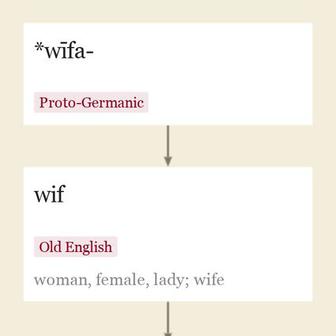fishwife n.
1520s, from fish (n.) + wife (n.) in the "
Entries linking to fishwife
"
Popularly, since Old English, "
Fish (n.) for "

Middle English wif, wyf, from Old English wif (neuter) "
Apparently felt as inadequate in its basic sense, leading to the more distinctive formation wifman (source of woman). Dutch wijf now means, in slang, "
The more usual Indo-European word is represented in English by queen/quean. Words for "
The modern sense of "
updated on November 12, 2014